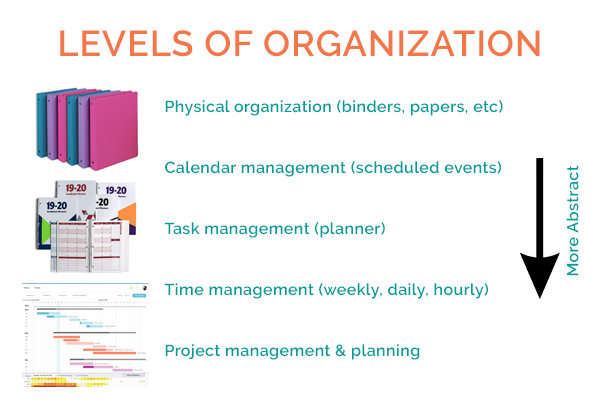Is your teen on top of everything they need to be?
Good organization is critical for students. Without good organizational systems & habits in place, students often struggle at school — not because they aren’t smart enough to earn good grades, but because they…
- Didn’t realize they had a test the next day
- Did their homework, but forgot to turn it in
- Forgot about their English essay until 10 pm the night before
- Left their textbook at school, and didn’t realize it was missing until the night before
- Waited until the day before their term project was due to start working on it
Does any of this sound familiar?
If so, then helping your teen get organized this semester could have a major impact on their success in school…not to mention their stress levels, sleep, and overall happiness!
Levels of Organization:
“Organization” is a very general term that can include everything from keeping track of where you left your math book, to keeping track of what you need to do in order to complete your term project by the end of the semester.
It can sometimes be helpful to think of the things students need to organize in terms of their level of complexity, ranging from immediate, physical things like binders & papers to the organization of more distant, intangible things like appointments and due dates for long-term assignments.


Most teens know it’s important to get organized and often want to feel more on top of things, but have a hard time knowing where to start. Rather than trying to change everything at once, it can be helpful for teens to begin by considering which areas of their life would be most helpful to organize so they can work on improving one at a time and not get so overwhelmed by the process.
To break it into manageable steps, here’s a checklist of the organization systems that can be helpful for students to set up at some point during the school year.
Organization checklist:
Physical things
- Backpack
- Binder(s)
- School supplies (extra paper, stapler, hole punch, pencils, eraser, etc.)
- File box & folders, for important reference documents (PSAT scores, etc.) and schoolwork that doesn’t need to be carried back & forth to school every day
- Locker (if you have one)
- Desk or study space
- Room / Closet / Bathroom
Events, to-dos, and ideas
- Calendar
- Planner / Agenda
- List or reminder system for personal to-do’s (if separate from planner & calendar)
- Email(s)
- Computer documents (Google Drive, Word & Excel files, etc.)
Added organization for older students
- Vehicle information (maintenance records, emissions reports, license & registration, etc.)
- College & scholarship applications and related information (acceptance letters, housing documents, etc.)
- Finances (receipts, bills, bank login information / pin #’s, budget, etc.)
- Household information (chores, errands, groceries to buy, recipes, etc.)
- Medical information (doctors’ contact info, appointments, prescription refill reminders, etc.)
Strategies for success:
Now that you have a better understanding of the different areas a student might want to get organized, here are some tips you can use to help them successfully set up an organization system they will use.
1. Take it one step at a time
Trying to get organized in all of these areas simultaneously is a recipe for disaster. Instead, encourage your teen to identify ONE area where they’d like to become more organized, create a strategy that works for them, and practice maintaining it for at least a week before moving on to the next area. It’s tempting to tackle everything at once, but working on one area at a time is more likely to lead to sustainable long-term results.
2. Personalize it
If a certain organizational approach has worked well for you, it can be tempting to try and set up a similar system for your teen. However, teens often think about things differently than their parents, and systems that work beautifully for you may not be as effective for your teen. In general, the more involved your teen can be in the process of designing and creating their organizational systems, the more effective they will tend to be. And – even more importantly – the more likely they’ll be able to keep up with and maintain them independently over the long term.
This isn’t just limited to parents & teens, either – this is also how we approach organization with students we’re coaching. Rather than telling a student there is one “right” way to get organized, we believe in collaborating with our students to create a personalized system that fits the way they naturally think and organize. By involving students in the creation process, they also gain a feeling of pride & ownership of the system they have created, which makes them more likely to actually use it!
3. Make it rewarding
In order for any new habit to work, it’s important to link following through with that habit – in this case, organization – to something that your teen actually cares about…whether it’s earning better grades, getting more sleep, having more free time, feeling less stressed, or even avoiding being “nagged” by their parents! Sometimes, at the beginning of establishing a habit, it can also be helpful for teens to create an additional incentive they will earn for following through with their plan. This could be something they give themselves – like taking a break to watch an episode of their favorite TV show after they finish cleaning their room, or something they receive from parents, like getting the car on Friday night after a week of filling in their planner successfully every day. Either way, this is ideally something you’ll want your teen to come up with because they think it will motivate them to follow through with their plan (…not something you create as a parent to motivate or incentivize a behavior you want them to do but they have no interest in changing.)
4. Keep up with it
Establishing an organizational system is one thing; maintaining it is another. You could have a great organizational strategy, but if you don’t set aside the time to maintain it, it will fall back into chaos after a very short period of time. So, encourage your teen to consider what he or she will need to do in order to keep their new organizational system up to date, and set aside a regular daily & weekly time to maintain it.
Creating some accountability for these updates is often a helpful strategy, but teens can be resistant to checking in with parents about their progress. If you do try to set up check-ins with your teen, you can reduce this resistance and make them easier for your teen to stick with by setting them up at consistent times your teen has agreed to in advance (ideally on a regular, predictable schedule – like after dinner on Sundays), that they’re short (under 15 min), and that they don’t come across as a lecture.
5. Treat it as an experiment
Sometimes it takes a bit of trial and error for students to find organizational strategies that work well for them. This is why we like to encourage our students to think about everything they do as an experiment, and view their “failures” and “successes” as data that will help them design even more effective approaches in the future. It can sometimes be challenging for students to adopt this attitude on their own, so it can be helpful for them to have a parent or coach who is able to help them reframe their “failed” attempts as learning opportunities, and encourage them to try again with another approach. If the first (or second, or third) approach they try doesn’t work, that’s OK! As long as they learn something from their experience and keep trying, they will eventually find a strategy that works for them.
Putting it into practice
If you could help your teen set up ONE of the organization systems in the list above (or something that isn’t on the list), which one would be at the top of your wish list?

Join 11,000+ parents helping their students earn better grades with less stress!

About The Author
Dr. Maggie Wray is a certified ADHD Coach & Academic Life Coach with a Ph.D. in Neurobiology and Behavior from Cornell and a Bachelor’s degree in Astrophysics from Princeton. She founded Creating Positive Futures in 2012 to help high school and college students learn how to earn better grades with less stress. Her team of dedicated coaches is on a mission to empower students to develop the mindset, organization, time management, and study skills they need to achieve their goals.
Related Posts
Other Posts You May Enjoy
How Does Your Teen Handle Failure?
How do you feel about failure?Most of us aren’t crazy about it. But at some point, no matter how hard we try, we’re going to fail at something. So, it’s important to consider how to respond to failure when it does happen, and how to improve our resilience so we’re...
Optimistic students earn better grades
Is your student more of an optimist, or a pessimist? Studies have shown that optimists experience a number of benefits later in life, as compared with their more pessimistic peers, including… Better test scores and higher GPAs Lower levels of stress, anxiety, and...
Starting before you’re motivated
Most students want to do well in school. But wanting to do well doesn't guarantee they will feel motivated to work on assignments in the moment. Even students who usually get good grades have days when they just don’t feel like doing homework or studying for their...




